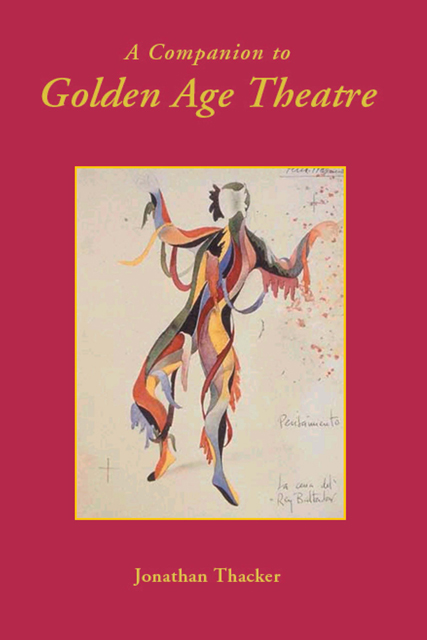Book contents
- Frontmatter
- Contents
- Dedication
- Foreword
- List of Abbreviations
- Introduction
- 1 The Emergence of the Comedia nueva
- 2 Lope de Vega
- 3 Cervantes, Tirso de Molina, and the First Generation
- 4 Calderón and the Comedia's Second Generation
- 5 Staging and Performance
- 6 Types of Comedia and Other Forms of Theatre
- 7 A Brief History of Reception
- Appendix 1 Verse Forms
- Appendix 2 English Translations of Golden Age Plays
- Suggestions for Further Reading
- Bibliography
- Index
Introduction
Published online by Cambridge University Press: 09 May 2023
- Frontmatter
- Contents
- Dedication
- Foreword
- List of Abbreviations
- Introduction
- 1 The Emergence of the Comedia nueva
- 2 Lope de Vega
- 3 Cervantes, Tirso de Molina, and the First Generation
- 4 Calderón and the Comedia's Second Generation
- 5 Staging and Performance
- 6 Types of Comedia and Other Forms of Theatre
- 7 A Brief History of Reception
- Appendix 1 Verse Forms
- Appendix 2 English Translations of Golden Age Plays
- Suggestions for Further Reading
- Bibliography
- Index
Summary
The early-modern period in Europe, broadly the sixteenth and seventeenth centuries, is regarded, as the epithet suggests, as critical in the development of the way Western cultures view themselves today. Spain experienced the tensions of this period with a particular intensity: its Empire, which had expanded confidently, providentially to some eyes, within the Old World and the New, fell into crisis and gradual but unrelenting decline. The Spain of Philip II (1556–98), Philip III (1598–1621) and Philip IV (1621–65) bred a succession of painters, poets, prose-writers and dramatists, who confronted and engaged with the issues at the heart of the period through their art. This flowering of the arts came to be known as the Golden Age – and for good reason.
The sixteenth century, which began with the kingdoms of Castile and Aragón newly united under Ferdinand and Isabella, and proceeded with expansion in the New World and military hegemony in Europe under Charles V, boasted considerable accomplishment in the arts. It had opened with Fernando de Rojas's extraordinary ‘dramatic’ work, the Tragicomedia de Calisto y Melibea (or Celestina); Garcilaso de la Vega had expanded the horizons of Spanish poetry in the 1520s and 1530s with his lyrical verse inspired by classical and Italian models; and the second half of the century would see the flowering of epic and religious poetry, the former represented by Ercilla's La Araucana, and the latter by Fray Luis de León and the mystics, San Juan de la Cruz and Santa Teresa de Ávila. Prose writing, dominated for a time by romances of chivalry, also developed in innovative directions as the picaresque was born. In the theatre two traditions, religious and popular, developed alongside each other, as we shall see. In painting this is the age of El Greco, in which Philip II attracted some of Europe's most prominent artists to his court.
However, in the last years of the reign of Philip II and the entirety of those of his son and grandson, a new sensibility is evident particularly in the form that art takes. This period, not quite congruent with the Golden Age itself, is often referred to, especially within Spain, as the Baroque (el Barroco).
- Type
- Chapter
- Information
- A Companion to Golden Age Theatre , pp. xi - xivPublisher: Boydell & BrewerPrint publication year: 2007



